While people all over China continue the fight against the outbreak of the coronavirus (COVID-19) epidemic, USTB has implemented a policy of “online teaching and study” in response to government regulations. Now teachers across all departments stand by to impart their knowledge and guidance to USTB students all over China. After careful preparation, theory courses for the new semester commenced through online teaching platforms as scheduled on February 24.
For the new semester, 1,688 theory courses for undergraduate programs and 534 theory courses for postgraduate programs commenced being taught through online teaching via multiple platforms, including Rain Classroom, Tencent Classroom, and Tencent Meeting. Course learning materials and assignments are released through the USTB curriculum center and WeChat groups.
At 8:00 am on February 24, Mr. XUE Qingguo, Vice Chancellor of USTB, organized a video conference with the Department of the Registrar, Graduate School, Department of Student Affairs, and International Student Center to hear reports on the commencement of the online teaching program.
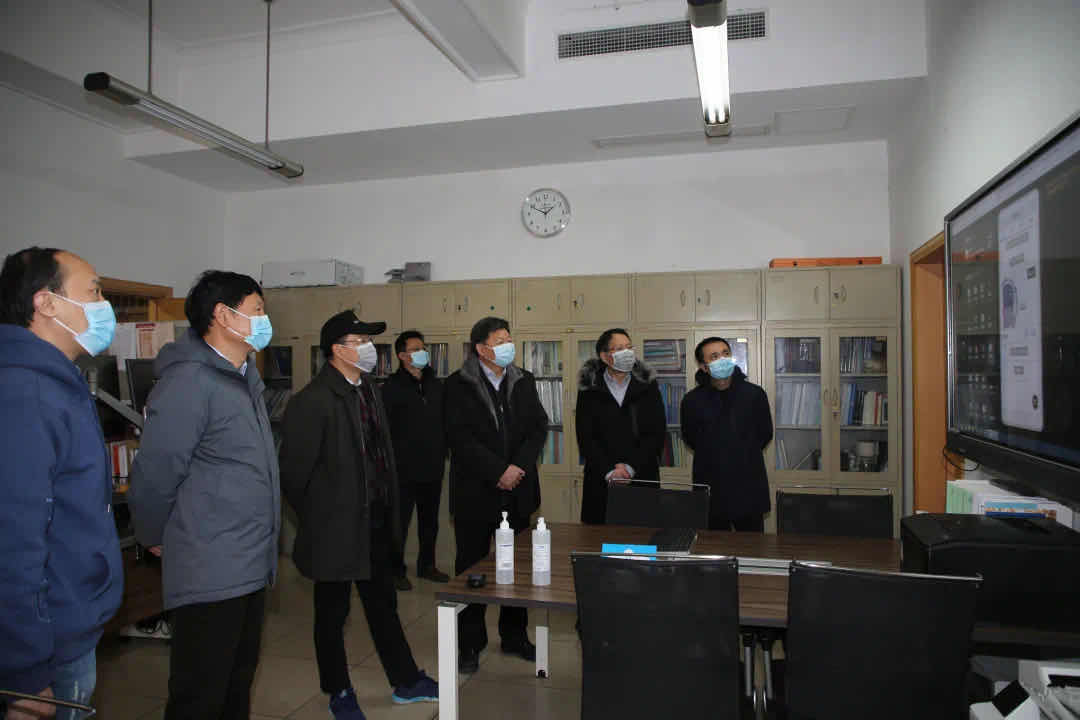
At 9:30 a.m, Mr. WU Guilong, Chancellor of USTB, Prof. YANG Renshu, President, and Prof. XUE Qingguo, Vice Chancellor, visited the Department of the Registrar in order to learn about online teaching through Rain Classroom and better understand the teaching conditions. Later on, the leaders went to Teaching Buildings 101 & 103 to watch lectures that were being broadcast for online lessons.
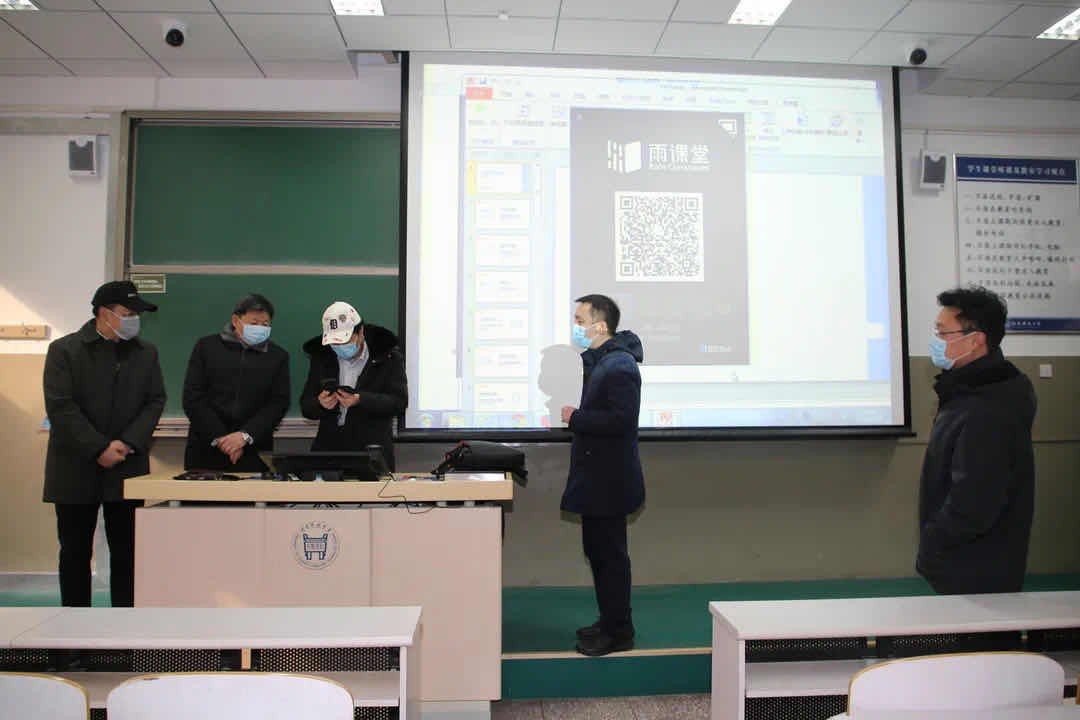
In order to guarantee the success of the online teaching efforts, relevant departments and units have cooperated with each other to provide the following services for teachers and students:
Establish two levels of technical support for schools, and set up on-call technical support for teachers. The university-level technical support group is composed of 37 technicians from the Graduate School, Department of the Registrar, International Student Center, and xuetangx.com. They are divided into 14 sub-groups to meet the needs of school-level technical support groups. The school-level technical support groups are composed of 94 leaders of teaching units, core teachers, and counselors, as well as 113 undergraduates and postgraduates, to serve the teachers and students across all departments.
Carry out training sessions and exercises for USTB teachers to learn online teaching strategies. Since Feb 11, USTB teachers were organized to attend three training sessions for online teaching. After these sessions, each work unit organized the teachers to participate in online teaching exercises and helped them to optimize their lesson plans to make them grasp online teaching strategies and skills.
Design excellent teaching plans for online coursework and cope with emergencies in a timely fashion. USTB has prepared Rain Classroom and Tencent Classroom operation manuals and trouble-shooting guidebooks on other major platforms to help teachers solve network problems promptly during online teaching sessions. Special expenses have been allocated to each teacher in order to purchase online teaching equipment. In addition, each classroom has been equipped with cameras and Rain Classroom and Tencent Classroom teaching software for teachers who may have difficulties in conducting online teaching at their homes or offices. So far, USTB has made full use of its online resources and arranged a MOOC resource platform and 39 online learning resources platforms to meet the needs of our teachers and students.
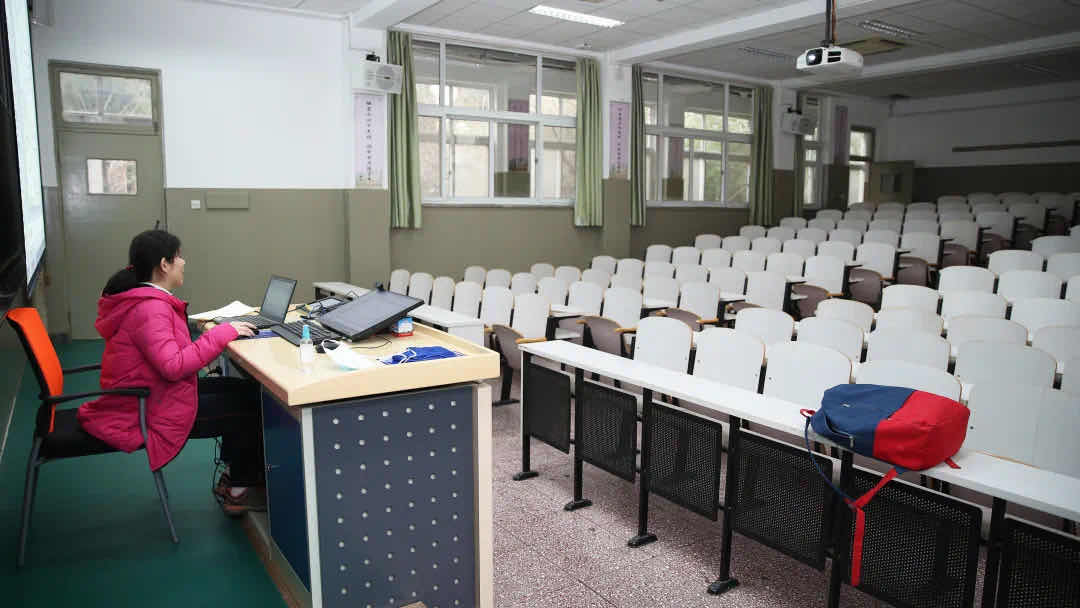
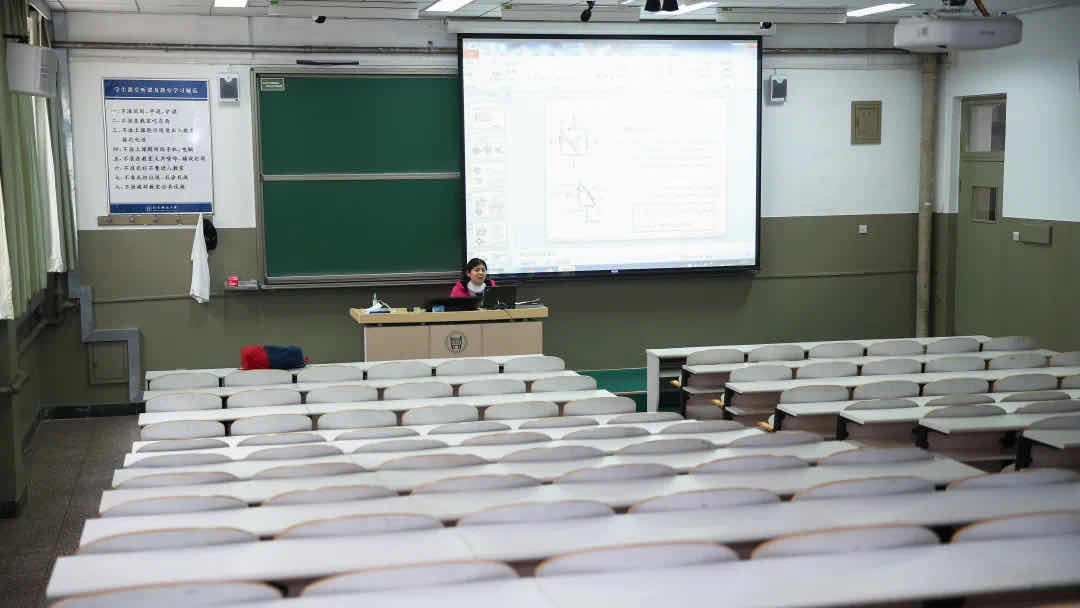
Have you taken lessons today? I’ve been here in class waiting for you, no matter where you are……
Both teachers and students need books for studying at home. During this unexpected period, how has the library prepared for online courses?
Since the COVID-19 outbreak, the library has actively worked to adjust its service model according to the university’s epidemic prevention and control requirements. The library has integrated various online electronic literature resources and services in order to allow teachers and students to use them in an easy and convenient manner. The prevention and control of COVID-19 is everyone’s responsibility. The USTB library staff are doing their part to participate in the prevention and control work, as they do their work according to regulations in order to protect our campus.
In light of the sudden outbreak of COVID-19, the library has summarized several guides on using online services and resources, with the hope that USTB teachers and students will continue reading, learning and researching, all while embracing their online coursework. The library will be at your service during the fight against the epidemic to help overcome all difficulties!
Q1
My book will be due very soon. Will it be overdue if I cannot return it as specified?
The library has suspended its regular services. No overdue penalties will be calculated for any borrowed book.
Q2
How can I use the library’s electronic resources at home?
①Go to: elib.ustb.edu.cn
User name: Faculty ID/Student ID
Password: Same as that for campus network
See the Guide to Library Electronic Resources Service during Epidemic Prevention and Control for details.
② Or go to: n.ustb.edu.cn, access electronic resources via the columns (suggestion: e-resources data navigation).
Instructions for VPN services: Instructions for Using Library Electronic Resources through VPN Services .
Please consult the Office of Information Technology for VPN user names, passwords, and usage.
Tel: 62334976
E-mail: wangjing@ustb.edu.cn
Q3
What common electronic resources are available?
In order to satisfy the needs of teachers and students, the library has reorganized its current electronic resources. You can read, study online and download relevant resources based on your needs. Any reader may visit the library’s homepage to browse and use relevant e-resources, including e-books, journals, academic dissertations, and patents.
The guides for using specific resources are as follows: refer to guides 1-5 for journal papers and scientific research literature; refer to guides 6-8 for e-books, textbooks, and teaching references.
1. Guide for Accessing Common Chinese Periodical Databases
2. Guide for Accessing Common Abstract and Indexing Databases
3. Guide tfor Accessing Full-Text Databases of Common Foreign Language Periodicals
4. Guide for Accessing Common Science and Engineering Numerical Databases
5. Guide for Accessing Common Humanities & Social Sciences Numerical Databases
6. Guide to Using Purchased Chinese Language E-books
7. Guide to Using Purchased Foreign Language E-books
8. Free E-books and Resources Published during the Epidemic
Q4
What should I do if I need sci-tech novelty retrieval and paper collection, quotation, and retrieval services?
During the fight against the epidemic, the library will continue providing sci-tech novelty retrieval and paper collection, quotation, and retrieval services to guarantee demands for information. Any student or faculty member may submit an application. See the Guide to Library Novelty Retrieval and Paper Collection and Quotation Services during Epidemic Prevention and Control for details.
Q5
Who can help me if I have any problem in using the online library services?
See the Contact Information for the Library during Epidemic Prevention and Control for details.
Q6
Where can I find the service information of the library?
The library has established a special column for resources and services in the “USTB Library” WeChat official account (being updated continuously) during the period of epidemic prevention and control to help teachers and students search for relevant information. Any user may click the lower right option (常用服务) in the “USTB Library” account, then click Common Services – Fighting the Epidemic (同心战“疫”), for details.
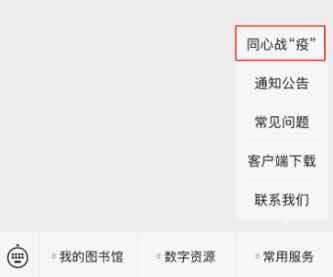
Links for library services during the epidemic prevention and control period:
1. Guide to Library Novelty Retrieval and Paper Collection and Quotation Services during Epidemic Prevention and Control Period
2. Guide to Library Electronic Resources Service during Epidemic Prevention and Control Period
3. Guide for Accessing Common Chinese Periodical Databases
4. Guide for Accessing Common Abstract and Indexing Databases
5. Guide for Accessing Full-Text Databases of Common Foreign Language Periodicals
6. Guide for Accessing Common Science and Engineering Numerical Databases
7. Guide for Accessing Common Humanities & Social Sciences Numerical Databases
8. Guide to Using Purchased Chinese Language E-books
9. Guide to Using Purchased Foreign Language E-books
10. Free E-books and Resources Published during the Epidemic


